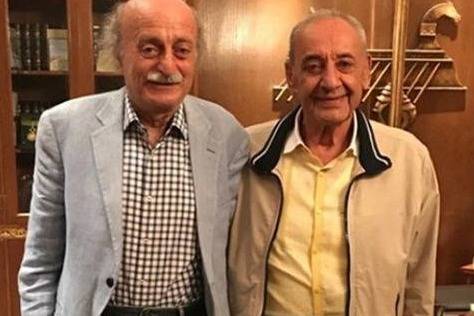
Lebanon's Parliament Speaker Nabih Berri stands next to Progressive Socialist Party leader Walid Jumblatt. (Illustration credit: NNA/File)
Speaker of Parliament Nabih Berri and former president of the Progressive Socialist Party Walid Jumblatt said on Sunday night that they did not understand the reason behind the security warnings sent over the weekend by several Gulf countries embassies.
Saudi Arabia, Kuwait, Bahrain and the United Arab Emirates called on their citizens to avoid traveling to Lebanon and to leave Lebanese territory. Qatar and Oman advised vigilance and the latter explicitly mentioned avoiding “areas of armed conflict.”
The warnings come after armed clashes ravaged Saida’s Ain al-Hilweh Palestinian refugee camp last week for six days. The clashes left at least 13 people dead, injured dozens and compelled hundreds of Palestinian families to flee the camp.
Berri met with Jumblatt in Ain al-Tineh, where for 30 minutes, they discussed the general situation and the latest security and political developments.
Following the meeting, Berri said to journalists present that the "Ain al-Hilweh clashes remained confined to a geographical area." He also negated any link between the clashes and the presidential elections. Jumblatt agreed with Berri that they are confined to a certain degree and added that "Palestinian and Lebanese efforts may lead to a solution."
A ceasefire was reached between the fighting Palestinian factions and has been enforced since Thursday night.
Regarding the presidential elections, Berri recalled that the French envoy to Lebanon Jean-Yves le Drian suggested to hold "a national dialogue and not scattered dialogues," between political parties. This proposal has been suggested, according to Berri's statement, by the so-called Group of Five which includes France, the US, Saudi Arabia, Qatar and Egypt, whose representatives met in Doha on July 17 to discuss the Lebanese crisis.
Despite tension between the two parties, the Free Patriotic Movement and Hezbollah started a dialogue last month to find a solution for Lebanon's persisting presidential vacuum.
Berri commented on the possibility of sanctions that could target him for his links with Hezbollah. In a letter sent to the Biden administration last Thursday, US Senator Jim Risch, who is the top Republican on the Foreign Relations Committee, described Berri as "an extension of Hezbollah."
"I am an extension of everything," stated Berri, declaring that he does not comply with pressure.
Several US Republican members of Congress asked on Thursday the Biden Administration to put sanctions on Lebanese politicians blocking the presidential elections, notably Berri.
In a statement published after the meeting, Jumblatt pointed out that his discussions with Berri also covered the "gas drilling that will happen at the end of this month or next month in the South." According to Jumblatt, "this is thanks to the great efforts made by Berri despite the obstacles that were made in front of him."
Around nine months after the demarcation of Lebanon’s southern maritime border with Israel, a ship with the TotalEnergies/Eni/QatarEnergy consortium is on its way to Lebanon to begin exploration in Bloc 9 to determine the presence of hydrocarbons. The ship is expected to arrive on Aug. 14.